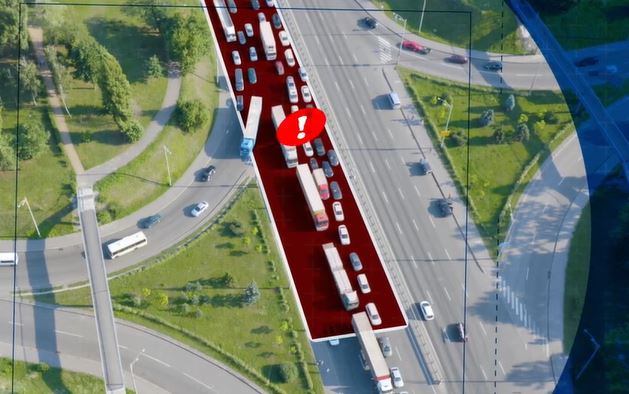Trimble and Purdue University Collaborate to Improve Highway Work Zone Safety

Advanced Technology Offers Proactive Alerting of Traffic Slow Downs for Commercial Vehicle Drivers to Prevent Work Zone Crashes
Trimble is developing a slowdown alert service that proactively notifies commercial drivers to slow down if there is a drop in road speed ahead to reduce back-of-queue accidents, particularly in work zone areas nationwide, based on the research of, and a collaboration with, Purdue University and its Joint Transportation Research Program (JTRP).
“We are big believers in the power of technology to empower drivers to make better, smarter, safer decisions on the road,” said Dan Popkin, executive, Trimble MAPS Division. “In the spirit of Trimble’s vision of delivering products and services that connect the physical and digital worlds—and by working with Purdue and the JTRP—we are enhancing our routing, scheduling, visualization and navigation platform to detect locations of work zone traffic queues throughout the U.S. to offer an advanced slowdown alert service to hundreds of thousands of professional drivers using our transportation-oriented solutions and in-cab truck navigation software. We are excited to work with the JTRP to help advance research and pioneer innovative technology that can reduce accidents and ultimately save lives.”
Construction work zones are a critical part of maintaining the accessibility and safety of national road infrastructure, but they can also pose safety risks. Work zone slowdowns can result in traffic buildups that cause sudden decelerations from 65 mph to less than 10 mph over short sections of highway. This creates particular safety risks for commercial trucks, which require up to 50 percent more stopping distance than cars and passenger vehicles.1 According to the latest National Work Zone Safety Information Clearinghouse statistics, 18,000 total crashes in U.S. work zones involved trucks. 2 Rear-end crashes are the most common type of work zone crash and the majority of fatal crashes occurred on roads with speed limits greater than 50 mph. In the past five years, these crashes have caused more than 4,400 people to lose their lives and 200,000 people to be injured, according to the U.S. Department of Transportation Federal Highway Administration Office of Safety.1
“Our research has shown that there is sufficient penetration of connected vehicles operating on highways that we can provide advance warning of interstate queues,” said Darcy Bullock, professor of Civil Engineering and director of the Joint Transportation Research Program, Purdue University. “If we can communicate that information in a timely and non-distracting manner to commercial vehicles, this will provide an opportunity to reduce rear end crashes involving trucks. Because Trimble MAPS has a large footprint in transportation and has deployed commercially designed technology to so many professional drivers worldwide, partnering with them was an obvious choice.”
As a result of this collaboration, Trimble’s slowdown alert service will interpret planned routes throughout the U.S, against real-time traffic incidents, such as roadwork and accidents, and slowdown patterns in order to understand congestion ahead. The service will deliver visual and audible in-cab slowdown alerts to drivers using Trimble’s commercial navigation and driver trip planning apps, CoPilot Truck and MileOn by PC*MILER, or through telematics and electronic logging device (ELD) providers that integrate these apps. The slowdown alert service will also be available as a part of the Trip Management API in the Trimble MAPS Platform. Drivers can download premium subscriptions of CoPilot Truck or MileOn by PC*MILER in the Google Play or Apple App Store, which includes the slowdown alerts. The slowdown alert service is expected to be available for these products at the end of the second quarter 2020. For more information about Trimble’s slowdown alert service watch the video.
“Construction zone safety for workers and motorists is our highest priority,” said Indiana Department of Transportation commissioner Joe McGuinness. “We are pleased to partner with private sector stakeholders in leveraging technology to make our highways safer for all.”
Category: Featured, Fleet Tracking, General Update, News, Safety, Tech Talk










